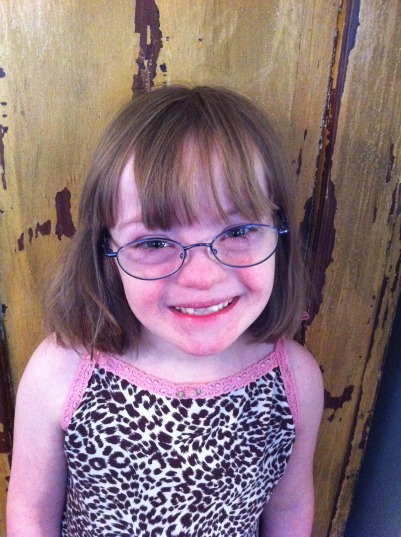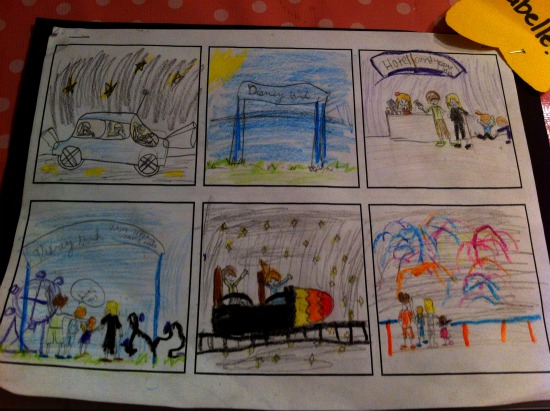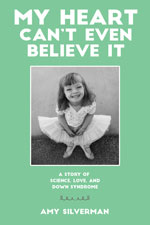
Not to be melodramatic or anything, but today something happened that completely shook my faith in everything I’ve come to believe about Sophie in the last 7 years, 10 months and two days — something that slammed me hard, right back into that bed in that hospital where she was born. Where the doctor told us he was wrong, that he’d said the baby didn’t have Down syndrome but the test came back and she did and — well, he didn’t say much after that.
The doctor left the room and I opened my mouth and cried like I’ve never cried before. I cried for Ray and Annabelle and for Sophie, I guess, but mostly I cried for me. I mourned the lives we’d thought we’d have — you always hear that from people who have kids with special needs, and it’s true. And I sobbed out of fear, because I had no idea what sort of person this tiny, yellowish, black-haired baby would be.
And then she grew. And so did I. We got Sophie all the therapy, all the “early intervention” we could scrape together. The helmet didn’t fix her flat head but the heart surgery worked (and when it failed, another operation worked, knock wood) and Sophie learned to walk (finally) and use the toilet (eventually) and she went to school.
Something remarkable happened at school. To a person, Sophie’s teachers and therapists all reported that she was remarkably intelligent. At first I thought they were just being nice, but after a while I leaned into it and it felt good to think that my daughter was smart. A new definition of smart, to be sure, but smart. When Sophie left pre-school there was a lot of talk and testing and scores that exceeded all expectations. I’ll admit it, I got cocky.
This isn’t about entrance to the National Honor Society. It’s about entrance to society in general. From what I can tell, only the smartest people with Down syndrome really have a shot at a quality life — at some measure of independence, love, meaningful friendships and work. I needed to believe that Sophie had a shot at that. Wouldn’t any parent?
In kindergarten, Sophie wrote her name at the end of the first week of school. She learned her letters and numbers and she held her own, and when the school said she couldn’t repeat kindergarten because she’d mastered the curriculum, I believed them. Ditto with first grade.
Sophie learned how to read. I couldn’t believe it, but she really and truly could read. Can read. The glowing (new definition of glowing, but still, glowing) reports continued. Second grade is tougher, for sure, but just two weeks ago, I sat with the teacher and the special ed teacher and they pulled out standardized test results and showed me how well Sophie is doing. How remarkably well.
Sure, I said last month, when it was time for Sophie’s three year re-evaluation. Give her all the tests. I knew that Sophie had behavior issues — trouble paying attention, following directions, probably a full-blown case of ADHD — but she’s smart. Give her all the tests, I told the school psychologist, a woman I’d never met.
Today we had a Big Meeting with all of Sophie’s teachers and therapists, the principal, some lawyers, the head of the district’s special ed program and the psychologist. Ultimately, all the data presented will help determine what services Sophie gets, and how her classroom setting will look — since third grade is a Big Step — but for today we were just reviewing the material.
I had a bad feeling. I’d flipped through the super-thick pile of papers I printed from the file the school sent over yesterday, and hadn’t been able to make much sense of it. Funny, I can analyze all kinds of reports and statistics for a newspaper story, but when it comes to my kid, all the numbers just swim across the page, not making sense. I even fumbled with the cassette player I brought to record the meeting, and I’ve been taping meetings for work for years.
So I wasn’t fully prepared for the numbers the psychologist put on the table. The low numbers. Really low numbers. Eye-stingingly low numbers.
Oh geez, ha ha ha, during the testing, Sophie pushed me every step of the way! the psychologist chirped, laughing. Took off her shoes and socks, pretended to pass gas. You name it.
I didn’t smile, even though I try to be friendly in these meetings. (I hate these meetings, even when good things are said.) Sophie’s lawyer (yes, Sophie has her own lawyer) said something about standardized testing not always reflecting true ability.
Next the academic findings were presented — glowing.
As we neared the end of the meeting, I couldn’t help myself. Look, I said, I need to say this for the record, while the tape recorders are still going. I get that as the mother, my opinion is, at best, flawed but compelling. But I have to say it. You all are reporting that Sophie is doing such amazing things. Reading so well, progressing at math. Terrific vocabulary. The only one who doesn’t have good news is the psychologist. And she’s the only one who hasn’t ever worked with Sophie before, who doesn’t know her.
I know her! the psychologist chirped.
Look, I said to the special ed teacher. I know Sophie tests you, but would she take off her shoes and socks with you?
No, the special ed teacher said softly, looking nervous.
I’m just saying that it seems pretty remarkable that Sophie can do all this stuff you say she can do, and her IQ is so low, I concluded.
Remarkable! the head of special ed for the district chirped from the other end of the table.
“I believe Sophie’s IQ really is 58,” the psychologist said, her voice rising — and shaking a little. “Sophie has the cognitive abilities of a three year old.”
And with that, my world crashed at my ankles. The entire world I’ve built, these last 7 years, 10 months and 2 days. A house of cards, full of platitudes and extra-kind words for the stressed out mom of the disabled kid? Maybe. But it was my house of cards. And now those cards were settling on the industrial school carpet under the big conference table.
Numbers, I can deal with. That comment? No way.
Around that table, silence.
Silence from the adaptive PE teacher, who last month caught me outside school and, with tears in her eyes, told me Sophie was the most incredible kid she’d ever seen — told me she was sure she’d one day live all on her own.
Silence from the teacher who, on more than one occasion, has told me that Sophie is utterly amazing — that with the help of computers, she can’t imagine how far the kid will go. And her reading!
Silence from the speech pathologist, who just moments ago had been going on about Sophie’s vocabulary.
And then several people started to talk at once, about how cognitive tests are almost always given by someone unfamiliar with the child, that a trained professional must administer them.
I get that, I said. I get that. And they moved on.
Not me. The meeting finally ended, and we filed out into the parking lot, but for me it wasn’t over. I couldn’t eat dinner, even though I’d skipped lunch. I rushed off to teach my writing class, then stopped at Target and bought — among other things — the purple nightgown Sophie’s been begging for. I made it home just in time to give it to her (Annabelle got the ballet skirt she’s been wanting) and sing both girls to sleep.
I cried all the way home, and this is terrible, but I was wondering how I’d feel when I saw Sophie. Does she have the cognitive abilities of a 3 year old? Really? Has all the rest been total bullshit? Does it matter? She’s still my dear, sweet, stubborn, funny, smart (yes, smart) Sophie. Even if all my expectations for her have been dashed –for now, anyway — by that psychologist.
Who knows. Maybe that woman did me the biggest favor yet, by telling me the truth. One thing’s for sure: I won’t be on solid ground again for a long time, if ever. And maybe that’s not the worst thing.
Another thing’s for sure: Sophie is still my Sophie, still the awesome girl I sent off to school this morning in her ridiculous Minnie Mouse hat from Disneyland because she absolutely insisted, the one who will find her way into my bed later and kick me all night.
Nothing will ever change that.















